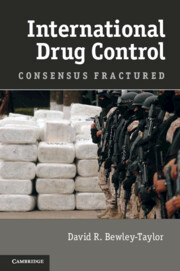Crossref Citations
This Book has been
cited by the following publications. This list is generated based on data provided by Crossref.
MacGregor, Susanne
2012.
Do we need a European drugs strategy?.
Drugs: Education, Prevention and Policy,
Vol. 19,
Issue. 6,
p.
429.
Hallam, Christopher
and
Taylor, Dave Bewley
2012.
IDPC Response to the 2011 Annual Report of the International Narcotics Control Board.
SSRN Electronic Journal,
2012.
Publications Received.
International Criminal Justice Review,
Vol. 22,
Issue. 4,
p.
478.
Reuter, Peter
2013.
Why Has US Drug Policy Changed So Little over 30 Years?.
Crime and Justice,
Vol. 42,
Issue. 1,
p.
75.
Klein, Axel
2013.
The Khat ban in the UK: What about the ‘scientific’ evidence? (Respond to this article at http://www.therai.org.uk/at/debate).
Anthropology Today,
Vol. 29,
Issue. 5,
p.
6.
Stevens, Alex
Ridout, Martin
Barratt, Monica
Lenton, Simon
and
Winstock, Adam
2013.
The Potential Effects of Policy Changes on Drug Markets in the UK and Australia: Estimates from a Survey of Drug Users.
SSRN Electronic Journal,
Fordham, Ann
2013.
The 2013 Commission on Narcotic Drugs: Report of Proceedings.
SSRN Electronic Journal,
Shammas, Victor L.
Sandberg, Sveinung
and
Pedersen, Willy
2014.
Trajectories to Mid- and Higher-level Drug Crimes.
British Journal of Criminology,
Vol. 54,
Issue. 4,
p.
592.
Thoumi, Francisco E.
2014.
Marijuana in the United States and the international drug control regime: Why what is promoted abroad is not applied at home.
Crime, Law and Social Change,
Vol. 61,
Issue. 3,
p.
273.
Larsson, Paul
2014.
Normaliseringen av det unormale - Utvidelsen i bruk av utradisjonelle politimetoder.
Nordisk politiforskning,
Vol. 1,
Issue. 1,
p.
41.
Reinarman, Craig
2014.
Die Sinnprovinz der Kriminalität.
p.
67.
Herschinger, Eva
2015.
The drugdispositif: Ambivalent materiality and the addiction of the global drug prohibition regime.
Security Dialogue,
Vol. 46,
Issue. 2,
p.
183.
Reinarman, Craig
2016.
Going Dutch.
Criminology & Public Policy,
Vol. 15,
Issue. 3,
p.
885.
Pedersen, Willy
Fjær, Eivind Grip
Gray, Paul
and
Soest, Tilmann von
2016.
Perceptions of Harms Associated With Tobacco, Alcohol, and Cannabis Among Students From the UK and Norway.
Contemporary Drug Problems,
Vol. 43,
Issue. 1,
p.
47.
Williams, Stewart
2016.
Space, scale and jurisdiction in health service provision for drug users: the legal geography of a supervised injecting facility.
Space and Polity,
Vol. 20,
Issue. 1,
p.
95.
2016.
Citizenship or Repression? Coca, Eradication and Development in the Andes.
Stability: International Journal of Security and Development,
Vol. 5,
Issue. 1,
Quirion, Bastien
2016.
Contrôle des drogues et mondialisation : enjeux et limites de la régulation internationale.
Drogues, santé et société,
Vol. 15,
Issue. 1,
p.
1.
Shammas, Victor L.
2016.
The Rise of a More Punitive State: On the Attenuation of Norwegian Penal Exceptionalism in an Era of Welfare State Transformation.
Critical Criminology,
Vol. 24,
Issue. 1,
p.
57.
MacGregor, Susanne
2017.
The Politics of Drugs.
p.
171.
Collins, John
2017.
Novel Psychoactive Substances.
p.
23.





